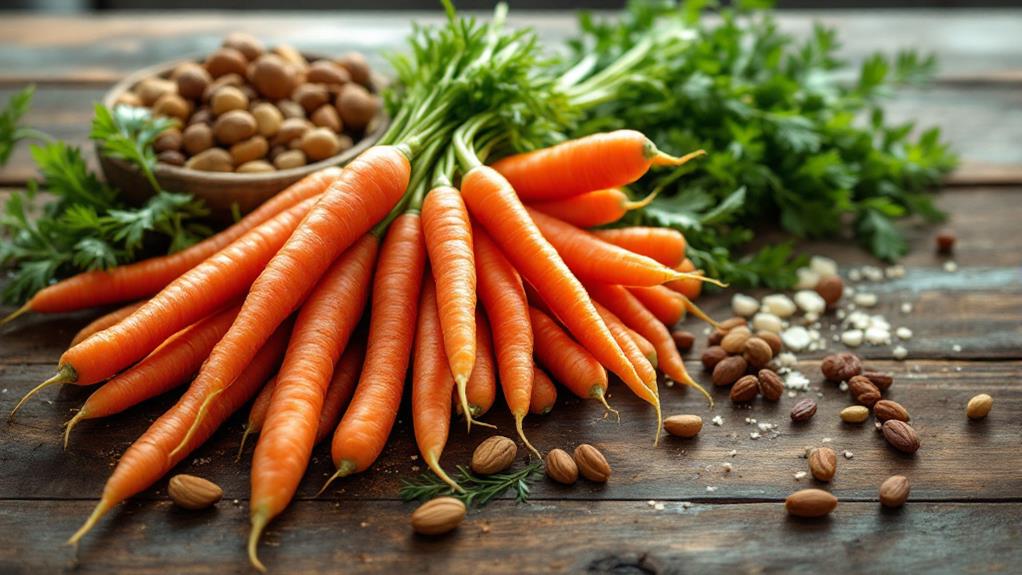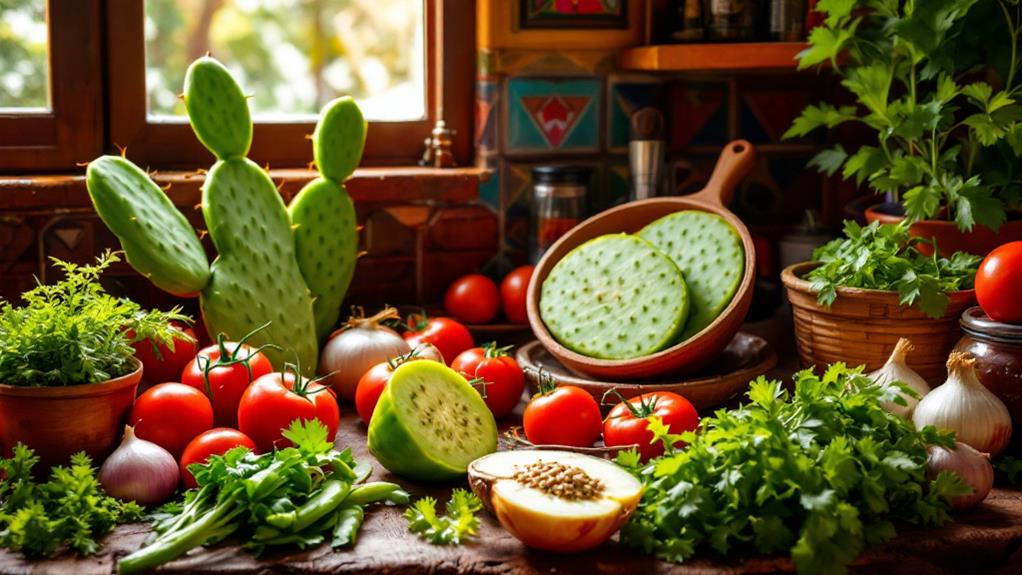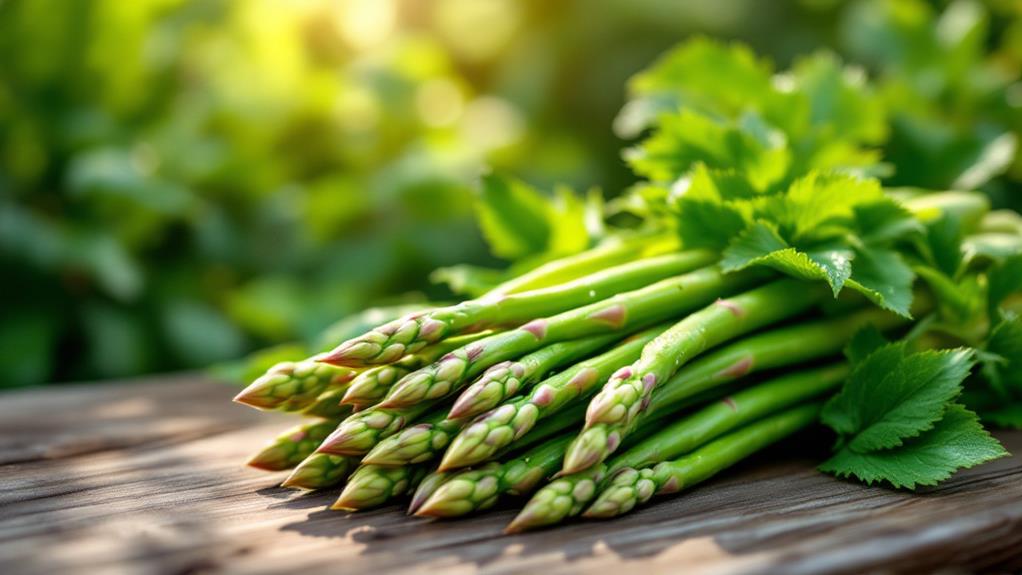An Ultimate Guide to Carrots: Nutrition, Health Benefits, and Recipes

You're in for a treat as carrots are much more than a crunchy snack. Originally purple or yellow from Afghanistan, they now pack a nutritional punch, especially in their familiar orange form bursting with vitamin A. Including carrots in your diet supports vision, immunity, and heart health, thanks to their high fiber and antioxidant content. Store them properly in a cool area to maintain freshness. Whether you're roasting them with herbs or tossing them raw into salads, carrots can enhance any dish. Discover more recipes and fascinating insights to deepen your appreciation for this lively vegetable.
History of Carrots
Some might not know that carrots have a rich history dating back to around 900 AD when they were initially cultivated in Afghanistan. These early carrots were not the lively orange you might imagine today; instead, they were purple or yellow. This humble root vegetable belongs to the Apiaceae family and is scientifically known as Daucus carota subsp. sativus. Over the centuries, carrots have undergone significant transformations, both in color and popularity. By the 15th and 16th centuries, orange carrots began to appear in Central Europe, marking a shift in their cultivation and culinary use.
As carrots spread globally, they became available in a range of colors, including orange, purple, yellow, and white. Each color variant offers unique flavors and nutritional benefits. Carrots are particularly renowned for their high vitamin A content, which is vital for maintaining good vision and supporting immune function. They also provide other fundamental nutrients like vitamins C and K, potassium, and magnesium, all contributing to multiple health benefits. Today, carrots are a staple in many diets worldwide, celebrated not only for their nutrition but also for their adaptability and global cultivation.
Types of Carrots
Carrots are not just a single type of vegetable; they come in a variety of forms, each bringing its own unique characteristics to the table. When investigating the different types of carrots, you'll encounter popular varieties like Imperator, Nantes, Danvers, and Chantenay. Imperator carrots are the long, tapered ones you often see in supermarkets. They're perfect for juicing and snacking due to their crisp texture. Nantes carrots, with their medium length and blunt tips, are loved by home gardeners for their sweetness, making them ideal for fresh eating and salads.
Danvers carrots stand out for their large size and versatility, easily slipping into any recipe you might have in mind, from soups to stews. Then there's the Chantenay type, shorter with broad shoulders, offering a rich flavor that's perfect for roasting or adding depth to stews.
Don't forget the purple carrots, the original variety, which are packed with anthocyanins, offering notable health benefits. Their lively color not only enhances the nutritional profile but also adds an eye-catching twist to your dishes. With these diverse types of carrots, you can investigate a world of flavors and culinary possibilities.
Growing Conditions

To cultivate thriving carrots, you'll need well-drained, fertile soil enriched with organic matter. Carrots thrive best in a pH level between 6.0 and 6.8. Guaranteeing the soil is well-drained prevents waterlogging, which can hinder root development. Here's how you can create the ideal growing conditions for your carrots:
- Planting Depth and Spacing: Sow the seeds 1/4 to 1/2 inch deep, spaced 3 inches apart. Leave 12-18 inches between rows to allow for peak root development.
- Sunlight: Carrots require full sunlight for at least 6 hours daily. This promotes healthy foliage and root growth, while cooler temperatures improve their sweetness.
- Watering: Keep the soil consistently moist but not waterlogged. Regular watering is vital, especially in dry periods, to support proper root development.
- Pest Monitoring: Watch for pests like aphids and root flies. These pests can affect the growth and quality of your carrots.
Harvesting occurs 55-80 days after planting. You'll know it's time when the foliage is fully grown and the carrots reach your desired size. By maintaining these conditions, you'll guarantee your carrots are flavorful and have the perfect texture.
Nutritional Profile
Packed with essential nutrients, carrots offer a powerhouse of health benefits. When examining their nutritional profile, you'll find that a medium-sized carrot (100g) contains about 41 calories, making it a low-calorie option for snacking or adding to meals. With 9.6g of carbohydrates, including 2.8g of fiber and 4.7g of natural sugars, carrots provide a balanced source of energy. Their low glycemic index, ranging from 30 to 85, guarantees that raw carrots help regulate blood sugar levels, making them an ideal choice for those monitoring their glucose intake.
Carrots are especially renowned for their high vitamin A content. Thanks to beta-carotene, a single cup (128g) provides up to 119% of your daily vitamin A needs. This is essential for eye health, as it supports good vision. Beyond vitamin A, carrots are rich in other vitamins and minerals, such as vitamins C, K1, potassium, and manganese, which contribute to maintaining comprehensive health.
Moreover, carrots boast powerful antioxidants like lutein and zeaxanthin. These compounds not only improve eye health but also combat oxidative stress, safeguarding your body from damaging free radicals. Enjoying raw carrots can be both nutritious and delicious!
Health Benefits

With an array of nutrients and antioxidants, carrots offer impressive health benefits. They're an excellent source of beta carotene, providing up to 73% of your daily vitamin A requirement per serving, which is essential for maintaining ideal vision health and enhancing immune function. The high fiber content in carrots, about 2g per half-cup serving, supports your digestive system, alleviates constipation, and promotes a feeling of fullness, aiding in weight management.
Incorporating carrots into your diet can also reduce your cancer risk. Their rich antioxidant content, including carotenoids and anthocyanins, helps combat oxidative stress, potentially lowering the risk of certain cancers like prostate and colon cancer. Additionally, regular consumption contributes to improved heart health by regulating blood pressure and lowering cholesterol levels, thanks to the potassium they contain.
Here's a quick rundown of the health benefits:
- Vision Health & Immune Function: Thanks to beta carotene and vitamin C, they support eyesight and strengthen your immune system.
- Digestive System & Weight Management: Their fiber content aids digestion and helps control weight.
- Cancer Risk Reduction: Antioxidants fight oxidative stress and may reduce cancer risk.
- Heart Health: Potassium in carrots helps maintain healthy blood pressure and cholesterol levels.
Potential Risks
Although carrots are highly nutritious and offer numerous health benefits, it's vital to be aware of their potential risks. Overconsumption can lead to carotenemia, where your skin may develop a yellow-orange hue due to high beta-carotene content. While harmless, it's a sign to monitor intake. If you have hypothyroidism, converting beta-carotene to vitamin A might be challenging, potentially leading to vitamin A deficiency, even with high carrot consumption.
For those with diabetes, it's imperative to be mindful of carrots' natural sugar content. Despite the fiber that helps regulate blood sugar, you should monitor intake to avoid a spike in your blood glucose levels. Moreover, if you have a sensitive stomach, excessive intake might lead to gastrointestinal discomfort due to their high fiber content.
Some individuals may experience oral allergy syndrome, characterized by itching or swelling in the mouth and throat after eating raw carrots. It's significant to be cautious and recognize these symptoms if they occur. Altogether, while carrots are a fantastic supplement to your diet, being aware of these potential risks can help you enjoy them healthily and safely.
Storage Tips

To keep your carrots fresh and crisp for as long as possible, proper storage is key. Follow these vital storage tips to extend the life of your carrots and enjoy their full flavor and nutritional benefits.
- Trim the Tops: Start by trimming off the leafy green tops, which can draw moisture away from the carrots, causing them to dry out more quickly. This simple step helps retain freshness and prevent dehydration.
- Use a Perforated Plastic Bag: Store your carrots in a perforated plastic bag. This allows for adequate ventilation, reducing spoilage while maintaining the necessary humidity levels. Aim for around 95% humidity to keep your carrots crisp.
- Choose the Right Spot: Place the carrots in your refrigerator's crisper drawer, which is designed to maintain ideal humidity levels. This environment helps your carrots stay fresh for up to two weeks.
- Avoid Ethylene-Producing Fruits: Keep carrots away from ethylene-producing fruits like apples and bananas. Ethylene gas accelerates spoilage, so separation is vital to maintaining your carrots' freshness.
Cooking Methods
Carrots offer a versatile palette of cooking methods that improve their natural flavors and nutritional benefits. If you prefer them raw, carrots can be a crunchy enhancement to salads, retaining their high vitamin content like vitamin C and fiber. For a softer texture, steaming is a great option. This method retains nutrients while enhancing their natural sweetness and making them easier to digest.
Roasting is another fantastic way to prepare carrots. Set your oven to 425°F (220°C) and roast the carrots for about 25-30 minutes. This caramelizes their sugars, intensifying their flavor and sweetness to create a tender consistency. When you're making soups or stews, carrots can impart a rich flavor while softening to your preferred texture, typically within 15 to 30 minutes of cooking.
For a concentrated source of nutrients, consider juicing. Drinking 4 to 8 ounces of fresh carrot juice daily provides ideal health benefits without losing any crucial nutrients. Each cooking method offers unique ways to enjoy carrots while maximizing their flavor and nutritional profile. Choose the method that best fits your taste and health preferences, ensuring you get the most from this lively vegetable.
Carrot Recipes

You'll often find carrots at the heart of countless delicious recipes that celebrate their versatility. Regardless of your search for a healthy snack or a main dish, carrot recipes offer something for everyone. Their natural sweetness and lively color make them a standout in both sweet and savory dishes.
- Gluten-Free Carrot Cake: This classic dessert gets a healthy twist, maintaining moisture while offering a delightful taste. It's a great way to enjoy carrots' nutritional value, packed with vitamins and antioxidants.
- Roasted Carrots: Improve their natural sweetness by roasting them with herbs like rosemary. This dish complements a healthy diet and can be a flavorful side to any meal.
- Carrot Juice: A nutrient-dense option that provides concentrated vitamins and antioxidants. Just 4 to 8 ounces daily can elevate your intake considerably.
- Carrot Ginger Soup: A comforting choice that highlights carrots' versatility in savory recipes. It's gluten-free and an excellent way to integrate more veggies into your diet.
For a healthy snack, enjoy raw carrots with dips like hummus. You can also incorporate grated carrots into muffins or pancakes to add moisture and raise their nutritional value without altering the flavor.
Organic vs. Conventional
Exploring the world of carrot recipes naturally leads to reflections about the quality of the carrots themselves, specifically the choice between organic and conventional options. Regarding carrots, organic varieties are grown without synthetic pesticides or fertilizers, appealing to those who prioritize reduced chemical exposure. In contrast, conventional carrots might contain pesticide residues, but don't worry—washing and peeling them effectively reduces this exposure.
Nutritionally, there's no significant difference between organic and conventional carrots. A study from 2012 found similar carotenoid and antioxidant levels, indicating comparable nutritional benefits. So, you don't have to compromise on health benefits when choosing between the two.
However, organic farming practices might improve soil health, potentially increasing antioxidant levels in organic carrots. This could be an added bonus if you're inclined towards organic options. Ultimately, the choice between organic and conventional carrots often boils down to personal preferences. If you're committed to supporting sustainable farming practices or reducing chemical exposure, organic might be your preference. On the other hand, if cost is a factor, conventional carrots provide similar nutritional and health benefits, making them a practical choice.




